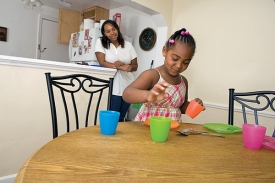Chores: How do you get kids to do them?
by Dawn Fuller
Despite all the grumbling and complaining children do, household chores actually play a vital role in helping them grow into responsible adults. So says a UC expert who works with the university's youngest learners — associate professor Victoria Carr, EdD '01, an early-childhood education researcher and director of UC's Arlitt Child and Family Research and Education Center.
One of the oldest and most diverse preschool programs in the United States, the Arlitt Center has provided educational excellence for children 3 to 5 years old for nearly 85 years. And guess what? The center's children are assigned chores, such as putting away their supplies, feeding the fish and assisting their instructors.
The key to building that responsibility at home, Carr says, is to get children started when they are young. Work closely with preschoolers to teach them routines and get them excited about tasks, she says.
"It sets up a sense of community — the notion that all of us live here and work here. At first, forcing chores can become a power struggle, so phasing them in is important."
Carr details the household tasks that match the age level of ability:
Pre-kindergarten – putting away toys, helping to feed pets, light dusting (They actually like to dust at this age, she says.)
Elementary – pulling weeds, sorting laundry, cleaning toilets with a brush, making their own bed
Middle school – taking out garbage, helping with dishes, sorting laundry, additional pet care duties, more yard and cleaning responsibilities
High school – mowing the grass, caring for younger siblings, doing the laundry
Carr adds that parents should not go back and finish a less-than-quality job done by children for two reasons. "Power struggles are ugly, and no one wins. Plus, learned helplessness or general ignoring of duty can occur. If a parent wants something done a specific way, teach it and help the child master it."
Carr recommends emphasizing the family community and everyone's role in it. "Use Grandma's rule: ‘First, you do your chores, then, you can do whatever it is you prefer … within reason, of course.'"

 Issue Archive
Issue Archive
